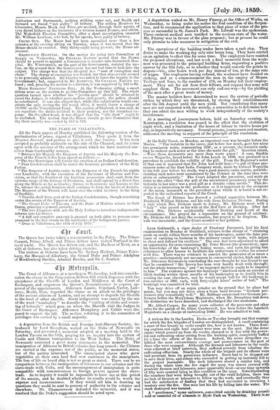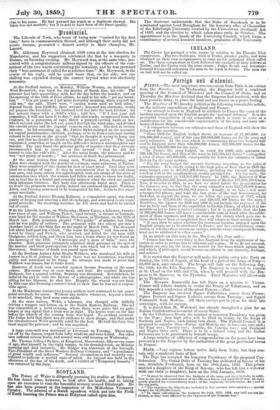tht 311ttrupn1io.
The Court of Aldermen, at a meeting on Wednesday, took into conside- ration the clause in the Corporation Reform Bill which dispenses with the attendance of the Sheriffs of London and Middlesex at the Court of Exchequer, and empowers the Queen's Remembrancer to express ap- proval of the appointments. Aldermen Laurie, Copeland, Carter, Law- rence, Meehi, Rose, regarded the clause as an attack on the privileges of the ancient citizens of London, and an attempt to degrade the Sheriffs to the level of other sheriffs. Great indignation was caused by the use of the word "tomfoolery" to describe the "cutting of sticks and count- ing of hobnails" which goes on when the Sheriffs visit the Judges in the Court of Exchequer. Aldermen Humphrey and Cubitt were dis- posed to support the bill. The motion referring it to the committee of privileges was carried by a small majority.
A deputation from the British and Foreign Anti-Slavery Society, in- troduced by Lord Brougham, waited on the Duke of Newcastle on Saturday, and presented a memorial adopted at a meeting held in the London Tavern on the 13th, praying for an inquiry into the system of Coolie and Chinese immigration to the West Indies. The Duke of Newcastle corrected a great many statements in the memorial. The immigration of Africans to British colonies has long ceased; the Chinese are carried at the expense, not of the public, as the memorial states, but of the parties interested. The emancipated slaves who grow vegetables on their own land find new customers in the immigrants. The loss of life on board ship is not so great as stated. There can be no comparison between the immigration of labourers to our colonies and the slave-trade with Cuba, and the encouragement of immigration is quite compatible with remonstrances to foreign powers against the slave- trade. As to inquiry it would be impossible to have one at this period of the session, and he doubted whether its results would be worth the expense and inconvenience. If they would aid him in drawing up questions they could be sent to persons of authority in the colonies and elsewhere. Mr. Chamerovzow defended the memorial, and it was resolved that the Duke's (suggestion should be acted upon. At the Rolls' Court, on Monday, an important case was brought before the Master. "The testatrix in the cause, just before her death, gave her niece two promissory notes, representing 2101., as a present, the testatrix omit- ting to endorse such notes at the time she made the gift." Question raised, —Were these documents any more than waste paper ? A case, Rankin versus Weguelin, heard before Sir John Leach in 1830, was produced as a precedent to establish the validity of the gift. From the Registrar's notes of that case it appeared that Sir John had held that—" a gift of three pro- missory notes of the East India Company stock, made by Colonel Weguelin to his wife just before his death, was a good donatio causa mortis, notwith- standing such notes were unendorsed by the Colonel at the time they were given or subsequently." The Court adopted the presedeut, and made an order to the effect "that the gift of the unendorsed promissory notes by the testatrix to her niece was a good gift as a donatio cause mortis." This de- cision is as interesting to the profession as it is important to the recipient of the notes, inasmuch as the precedent upon which it is based is not re- ported in the authorized reports of the Court.
The Court of Divorce has decreed a judicial separation between Mr. Frederick William Dickens, and his wife Anna Delancey Dickens. During a visit which Mrs. Dickens made to Jersey, Mr. Dickens went with a " lady " who passed as his wife at the Red Lion at Dorking. After her return Mrs. Dickens accidentally visited Dorking and heard of the circumstance. She prayed for a separation on the ground of adultery. Mr. Dickens did not deny the accusation, but prayed to be forgiven. The wife was inexorable, and the Court acceded to her petition.
Lyon Goldsmith, a cigar dealer of Finsbury Pavement, had his final examination on Monday at Guildhall, relative to the charge of "obtaining goods on credit within three months of his bankruptcy, under the false pre- tence of carrying on busineas in the ordinary course of trade, with intent to cheat and defraud his creditors." The case had been adjourned to afford an opportunity for cross-examining Mr. Peter Brown (the prosecutor), upon his knowledge of the bankrupt's failing meene, and upon his giving him references to other houses to facilitate his endeavours to reduce hie account with him. There was no evidence to convict the prosecutor of so mean a practice—unfortunately not uncommon in commercial circles, high and low. Mr. Alderman Salomons in concluding the ease thought he was bound to say that he considered "Mr. Brown has been very hardly dealt with through- out the whole transaction," and "no improper motives ought to be imputed to him." The evidence against the bankrupt "disclosed such an amount of illicit trading within three months of his bankruptcy as to ,justify him in sending the case elsewhere and he would accept bad for the bankrupt in two sureties of 5001. each, with forty-eight hours' notice of bail." The bankrupt was committed for trial.
You may drive off an organ grinder on the ground that he plays bad music, but you may not drive away a brass band because "German per- formers play remarkably well." Mr. Babbage summoned two German per- formers before the Marylebone Magistrate when Mr. Broughton laid down the distinction we have described, and discharged the two musicians.
Mr. Alfred Cooper, for many years collector of the poor-rate and other rates for the parish of St. Giles, Camberwell, has been before the Lambeth Magistrate on a charge of embezzling 1000/. He was admitted to bail.
A serious fire in the London Docks on Tuesday brought out that courage for which the fire brigades of London are distinguished. A vault containing a store of fine brandy in casks caught fire, how is not known. Three float- ing engines and eight land engines were soon on the spot. But the dense smoke which poured up from the vaults, charged as it was with the power- ful and suffocating odour arising from the burning spirit, completely baffled for a time the efforts of the firemen. Indeed, the scene altogether ex- hibited the most extraordinary courage and perseverance on the part of those who were engaged. Although the firemen and labourers in the vaults were relieved at brief intervals, they suffered severely from inhaling the suffocating effluvium. Nearly the whole of the brigade and its officers were laid prostrate from its pernicious influence. Some had to be dragged out to save their lives, and others who succeeded in getting up instantly fell to the ground insensible. The dock labourers shared a similar late' and during the whole time the fire raged the quay was almost covered with prostrate firemen and labourers, some apparently dead—atone time upwards of fifty were counted lying in this condition on the quay. Notwithstanding the numbers that were being brought out of the vault helpless, there was no lack of firemen or labourers to follow up the work, and eventually they had the satisfaction of finding that they had succeeded in obtaining a mastery over the fire. One man lost his life by falling into the water. The stock destroyed was insured. A "gentleman," name usiknown, committed suicide by drinking prussic acid or essential oil of almonds in Hyde Park on Wednesday. There is ne
A deputation waited on Mr. Henry Fitzroy, at the Office of Works, on Wednesday, to bring under his notice the foul condition of the Serpen- tine, and to recommend the application to that piece of water of the pro- cess so successful in St. James's Park. Mr. Lilwall was the spokesman. Three eminent medical men testified to the noxious state of the water. Mr. Fitzroy was in favour of the plan proposed; but at present he could only promise to take measures in mitigation of the evil.
The operatives of the building trades have taken a rash step. They desire to make the working day only nine hours long. They have carried on an agitation to effect this for some time. The employers have resisted the proposed alterations, and last week a final memorial from the work- men was presented to the principal building firms, requesting a positive answer by the 22d July, as to whether they would concede the points in dispute—viz., nine hours work per day instead of ten, at the same rate of wages. The employers having refused, the workmen have decided on , striking, and as a commencement the men in the employ of Messrs. Trollope and Sons, to the number of 470, on Monday left their-employ- ment. They ask for aid from their fellows, and request that none will supplant them. The movement can only end one way—by the yielding of the men after a great waste of money.
The master builders have determined to meet the sydem of periodic strikes by which they are threatened, by closing their establishments after the 6th August until the men yield. But considering that many men are not connected with the society, a committee is to determine how they can admit the men willing to work independently of the society's interference.
At a meeting of journeymen bakers, held on Saturday evening, in Kennington, a resolution was passed to the effect that the abolition of night work, and a limitation of the hours of labour to twelve hours per day, is imperatively necessary. Several persons, journeymen and masters, addressed the meeting in support of the principle of the resolution. due to his name. He had pawned his watch as a duplicate showed. His linen was not marked ; but it is said to have been of the finest quality.



























 Previous page
Previous page